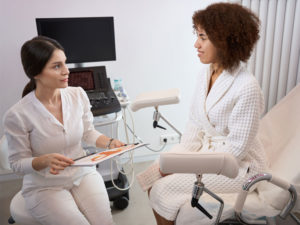
Women’s preventive care is often underrated. With your overcharged and busy life and the care you give to your family and others, it’s easy to forget to take care of your own health. However, prioritizing your healthcare is vital to living long and healthy years.
This crucial aspect of healthcare aims to maintain and promote your overall well-being. It prevents or detects health issues at an early stage when there’s still time to take action and get better outcomes.
So, taking charge of your health can be as simple as regularly seeing your primary care doctor. Make sense? Read on to find out the primary preventive services you should have throughout your life – including the type of screenings you should get according to your age, and much more.
Table of Contents
What is Women’s Preventive Care?
Why is Women’s Preventive Healthcare So Important?
Guidelines for Recommended Preventive Services
Women’s Right to Access Healthcare and Preventive Services
What is Women’s Preventive Care?
Let’s start with the basics. Women’s preventive care is a set of healthcare services, guidelines, and screenings specifically designed to detect and prevent potential health issues in women. It combines general and gynecological care and preventive and problem-focused visits.
While preventive visits focus on maintaining good health and identifying risk factors through screenings, vaccinations, and discussions about lifestyle choices, problem-focused visits are initiated when there’s a specific health concern or problem. They’re more targeted, addressing a particular issue or symptom that needs attention.
Several healthcare professionals can provide women’s care, including:
- Primary Care Physicians (PCPs)
- Obstetricians/Gynecologists (ObGyns)
- Nurse Practitioners (NPs)
- Physician Assistants (PAs)
Why is Women’s Preventive Healthcare So Important?
Seeing your doctor regularly and following women’s care guidelines may save your life. At the very least it promotes optimal health and quality of life by preventing severe illnesses, like cervical or breast cancer, or treating them after diagnosis.
In addition, women’s preventive care empowers you to make informed decisions about your reproductive and overall health.
So, that said, why is health screening important?
Here are some of the main reasons.
Early Detection of Health Issues:
Regular preventive screenings and exams can detect potential health issues early. This improves the outcome and reduces the severity of certain conditions, including breast cancer and chronic diseases.
Prevention of Serious Illnesses:
Vaccinations and screenings help prevent serious illnesses. For example, vaccines can protect against infections like HPV. Cervical cancer screening and mammograms can detect cancers at an early, more treatable stage.
Promotion of Reproductive Health:
Gynecological care is essential for monitoring and maintaining your reproductive health. Regular exams, such as Pap smears, chlamydia screening, and pelvic exams, help detect abnormalities or potential issues with your reproductive organs. This enables timely intervention.
Management of Chronic Conditions:
Preventive measures are crucial for monitoring and managing chronic conditions such as diabetes, hypertension, and cardiovascular diseases.
Education and Counseling:
During your visits, your healthcare provider can support you about healthy lifestyle choices, nutrition, and the importance of physical activity and quality sleep. They can also provide advice and counseling on contraception, family planning, and sexual health during these visits.
Empowerment and Advocacy:
Services that focus on women’s health and preventive care empower you to take charge of your health. Regular checkups and screenings encourage you to be aware of and take personal responsibility for your health. You’re then more informed and proactive in advocating for your health needs!
Now that you know how crucial women’s care is for your health, let’s dive into the specific care, screenings, and exams you should have according to your age, risk factors, and family history.
Guidelines for Recommended Preventive Services
As you grow older, the risks of developing specific health conditions increase. In the same way, genetics and lifestyle choices can also significantly impact your health.
For this reason, your preventive visits, exams, and screenings follow a timeline and specific guidelines. These help healthcare professionals determine the most effective and appropriate preventive measures for you.
Women’s health screening guidelines come from reputable healthcare organizations and government agencies, using evidence-based recommendations regarding the benefits and harms of specific preventive services, considering age and risk factors.
In the U.S., the Women’s Preventive Services Initiative (WPSI) and the US Preventive Services Task Force (USPSTF) are the two organizations that develop and update women’s preventive services guidelines. They guide providers in offering comprehensive and effective care for you across your lifespan.
Here’s an overview of the Women’s Preventive Services Initiative (WPSI) guidelines and the timeline of exams. It’s based on commonly recommended screenings and tests you should take at different times in your life.
General Preventive Care
1. Blood Pressure Screening
Starting as early as the teenage years, regular blood pressure monitoring helps identify and manage hypertension. This reduces your risk of heart disease, stroke, and kidney problems.
If you don’t have a family history, genetics, and other risk factors for heart disease, you should monitor your blood pressure at least every two years. This frequency should increase as you age and for average-risk women – obese, smokers, and diabetic.
2. Cholesterol Levels Check
Just like blood pressure measurement, monitoring your cholesterol levels also helps prevent cardiovascular diseases. If you’re at low risk, you should check your cholesterol levels every four to six years, starting at age 20.
But suppose you have risk factors for heart disease, such as smoking, high blood pressure, diabetes, obesity, a family history of heart disease, a sedentary lifestyle, or other conditions? In that case, monitor your cholesterol levels more often, as determined by your primary care doctor.
Postmenopausal and average-risk women are also advised to have more frequent cholesterol checks, as the risk of heart disease tends to increase after menopause.
3. Blood Glucose Test
The blood glucose test measures your blood sugar levels – the amount of sugar in your bloodstream. It’s an essential component of women’s preventive care because it can detect diabetes and prediabetes early.
Early detection of these conditions allows for prompt intervention and lifestyle modifications to manage them effectively. This means you avoid developing complications such as heart disease, stroke, kidney disease, vision problems, or a possible limb amputation.
The age to start and frequency of testing vary, based on individual risk factors, but the general recommendation for most women is to begin diabetes screening around 45 for low-risk women, with a test every three years.
If you have moderate to high-risk factors, such as a family history of diabetes or perhaps polycystic ovary syndrome (PCOS), you may need to start diabetes screening earlier and take the test annually or more frequently. Your doctor will advise you.
The exception to these rules is during pregnancy. All pregnant women must be screened between 24 and 28 weeks of pregnancy to prevent gestational diabetes and to reduce the risk of complications for both mother and baby.
4 Osteoporosis Screening
Osteoporosis screening is recommended for menopausal and postmenopausal women to assess bone density and identify the risk of fractures associated with weakened bones. The frequency and age to start screening may vary, based on your risk factors and your healthcare provider’s recommendations.
But in general, The USPSTF recommends bone density testing for women aged 65 and older and earlier screening for high-risk women, including a history of fractures, low body weight, family history, smoking, excessive alcohol consumption, and certain medical conditions and medications.
If you’re a postmenopausal woman, you may be screened every 1-2 years or less frequently based on your bone health status.
Gynecological Care
1. Pelvic Exam
A healthcare provider typically performs a pelvic exam during routine gynecological examinations. This screens for reproductive health issues, including abnormalities in your cervix, uterus, ovaries, and vagina.
The American College of Obstetricians and Gynecologists (ACOG) recommends a first pelvic exam between the ages of 21 and 25 or when you become sexually active – whichever comes first.
After the initial pelvic exam, the frequency of subsequent exams may vary according to your health needs and history and the presence of specific risk factors. But in general, the ACOG recommends annual well-woman visits, which include pelvic exams.
This exam is crucial for your reproductive health, as it may include:
- Screening for reproductive health issues.
- Pap smear and cervical cancer screening.
- Screening for sexually transmitted infections (STIs), including chlamydia screening.
- Clinical breast exam to detect abnormalities and breast cancer risks.
- Assessment of your pelvic organ health, such as your uterus and ovaries, to prevent or detect any abnormalities or conditions that may require further investigation.
- Evaluation of reproductive health concerns, such as menstrual irregularities or pelvic pain.
- Discussion of birth control and family planning.
- Your doctor may also request a colon cancer screening, depending on your risk factors. Colon cancer screening is recommended for everyone after 45 years old.
2. Pap Smear and HPV Testing
Regular cervical cancer screening through Pap smears and HPV testing is critical to detect abnormal cells on your cervix that can lead to cervical cancer.
Guidelines for these tests vary slightly depending on your age and risk factors, but the general recommendation is every three years from 21 to 29 years old, and you should do your first Pap Smear at age 21.
If you’re 30 to 65, you should also do a Pap smear every three years in combination with HPV testing every five years (co-testing). And if you’re 65 or older and have had regular screenings with typical results, the frequency may be reduced or stopped, depending on your health history.
HPV testing should begin at age 30 and be done every five years alone, or combined with Pap smears. This test is crucial to identify the presence of the high-risk HPV types associated with cervical cancer.
If you prefer not to have co-testing, you can also have an HPV test alone every five years. And if you had a total hysterectomy – a surgery to remove your uterus and cervix – you may not need Pap smears or HPV testing unless your hysterectomy was performed due to cervical cancer or precancerous conditions.
That’s a lot of information to take in, but your overall health depends on preventive care!
3. Mammogram
Mammography screening is key for early detection of breast cancer, allowing for timely intervention and improved treatment outcomes.
Though recommendations may vary according to your health condition, family history, and other risk factors for breast cancer, the Women’s Preventive Services Initiative recommends your first mammogram at 40, and you should have one every one to two years or annually if you’re older than 50.
In addition to a mammography screening, you’re encouraged to do monthly self-exams regardless of age. Observe any abnormal changes and report them immediately to your doctor, who will evaluate your risks for breast cancer.
4. STI Screening
Sexually transmitted infection (STI) screenings aim to
- detect and manage sexually transmitted infections and diseases early,
- reduce transmission, and
- promote overall sexual health.
In addition, STI screenings provide an opportunity for healthcare providers to educate you about safe sexual practices, condom use, and risk reduction strategies.
These screenings usually begin when you become sexually active, or if you’re pregnant, or trying to conceive. Detecting and managing STIs during pregnancy is crucial to prevent transmission to your fetus and reduce your risk of adverse pregnancy outcomes.
The specific recommendations from the US Preventive Services Task Force for STI screenings can vary based on your risk factors, age, and sexual activity. But some standard STI screenings include:
- Annual chlamydia and gonorrhea screening in sexually active women under 25 or older women with risk factors.
- HIV (Human Immunodeficiency Virus) for all sexually active individuals, typically starting in adolescence. Low-risk women should do an HIV testing at least once, and those with ongoing risk factors should do it more frequently.
- Periodic syphilis screening based on risk factors.
- Periodic hepatitis B and C screenings, based on risk factors, including sexual activity.
Women’s Right to Access Healthcare and Preventive Services
Since the implementation of the Affordable Care Act (ACA) in the United States in 2010, many women’s care services have accepted health insurance coverage without cost-sharing, meaning that policyholders do not have to pay copayments, coinsurance, or deductibles for these services.
The WPSI Guidelines, developed as a result of the ACA, outline a comprehensive set of preventive services that should be covered without cost-sharing. Some of these services with health insurance coverage include:
- Well-woman visits
- Gestational diabetes screening
- Human papillomavirus (HPV) DNA testing for women 30 years and older
- Sexually transmitted infection (STI) counseling
- HIV screening and counseling
- Contraceptive methods and counseling
- Breastfeeding support, supplies, and counseling
- Screening and counseling for mental health and interpersonal and domestic violence
Don’t miss the chance to improve your health due to financial concerns!
Check your specific health insurance plan documents, contact your insurance provider, or consult with your employer’s benefits department to understand the details of health insurance coverage for the women’s care services you need.
Empower Yourself and Make Proactive Health Choices with Stella Mattina
At Stella Mattina, we believe in the strength of prevention in women’s health. We’re passionate about you taking charge of your well-being, so we provide specialized women’s care services that focus on you and your needs.
Schedule your consultation today and let’s talk!
Dr. Krum is currently in practice in Arlington, TX. He received his undergraduate degree at Texas A&M University, then attended UTMB Galveston for medical school, finishing in 1986, completing his residency there in 1990. Providing a full range of obstetrical and gynecological care, he specializes in the treatment of endometriosis and robotic surgery. He arranges his schedule so that same-day appointments are usually available.






